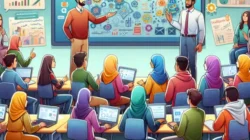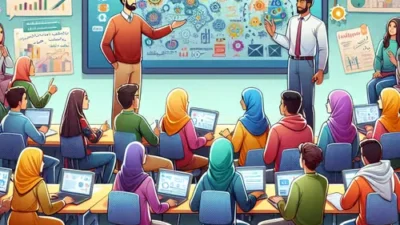Indonesia is an island country with many tribes, languages, and cultures. Indonesian art and culture is an ancestral wealth and heritage that must be preserved.
Art is something beautiful for people who see, hear, and feel. However, culture is a learning process that can only be triggered by humans and produce works that are not rooted in morality. So, art and culture are defined as works that have the value of beauty taken by human beings (Koentjaraningrat, 2015).
The establishment of culture and art throughout the world was assisted by Indonesian social and cultural diversity. Traditional art is commonly regarded as a cultural expression and identity based on local wisdom and the uniqueness of the community.
Moreover, traditional art has existed and developed through the traditions or customs of the society as well as to maintain social collectivity. Globalization is an event that has brought about many changes in all aspects of society’s life, especially the younger generation.
The ease of access to information transforms the mindset of the younger generation into a more modern one. This can influence the interest of younger generations in preserving Indonesian traditional art. Overall, Indonesian traditional art is influenced by the complex dynamics brought by globalization.
There are opportunities for preservation and promotion, but there is a challenge to preserve the authenticity and depth of the culture contained in art. The response to globalization must balance the preservation of tradition and the acceptance of change that brings innovation.
Moreover, Indonesia is a country rich in cultural diversity and art, traditional art facing challenges and opportunities due to the impact of globalization on many aspects of life around the world, including traditional art.
The Impact of Globalization on Traditional Arts
All aspects of society are affected by globalization, including culture. Culture can be defined as the values adhered to by societies and their perceptions of things, one of which is art. With the rise of information technology and telecommunications, cultural preservation values seem to fade.
The local culture of Indonesia is disappearing from society. In fact, if properly managed, these arts and cultures can be a profitable source of tourism that can boost the country’s income and provide employment opportunities for the surrounding communities. Here are the positive and negative impacts as follows:
Positive Impact of Globalization
- By showing its social and cultural values to the world, Indonesia can attract foreign tourists to Indonesia, which will benefit its people and its own country.
- The social and cultural values of other countries can be learned by Indonesia, so that we can take these values and cultivate them in Indonesia without changing our own identity.
Negative Impact of Globalization
- Exchanges of art and culture or recognition of ownership by other countries occur, such as Indonesian priests’ dances and traditional arts recognized by Malaysia, which are clearly detrimental to Indonesia.
- The values adopted by the West are becoming more and more accepted by Indonesia. This leads to the loss of Indonesian identity because of Western culture contrary to the ideology of the State of Indonesia or pancasila
- Acculturation of arts and culture occurs between western and eastern cultures. This is detrimental because most Western culture does not comply with the standards that apply in Indonesia (Nurhasanah et al., 2021)
Anticipative Steps To Prevent The Region’s Cultural Fading
- They hold cultural festivals regularly, which students participate in at school and outside of school. This cultural festival is held to inform the Indonesian people and youth about Indonesian culture.
- Leather and other cultural arts are shown at school. It aims to teach students about the art of Indonesian culture, which is disappearing due to globalization.
- In order to inform schoolchildren about the variety of indigenous Indonesian clothes
- Understanding culture and its different aspects raises love for our own culture.
- Adding regional culture as local content in schools (Suneki, 2012)
Solutions for Preserving Arts and Culture in the Era of Globalization
Strengthening Education and Training
Enhancing educational curricula in schools to include material on traditional art, providing training to traditional artists to enhance their ability to create and innovate, and holding workshops and seminars on traditional arts to increase public knowledge.
Use of Technology
Using technology to promote traditional art to the wider community, both through social media, websites, and mobile applications.Use technology to create innovative and attractive traditional art works for younger generations as well as developing digital platforms to make it easier for people to access information and buy traditional art products.
Implementation of Cultural Values
Implanting the cultural values of the nation to the young generation from an early age, so that they have a sense of love and pride for traditional art.
Read More: Nyepi and Ramadhan: Fostering Religious Tolerance
By applying the above solutions, it is hoped that Indonesian traditional art can remain sustainable and become a precious cultural heritage of the nation. It is important to remember that preserving traditional art is a shared responsibility. Therefore, all parties must work together to preserve and preserve Indonesian traditional art.
Author: Lailatul Qudsiyah
Student of Arabic Language Education, University of Muhammadiyah Prof. Dr. Hamka
References
Koentjaraningrat. (2015). Pengantar Ilmu Antropologi. Rineka Cipta, 2507(1), 1–9.
Nurhasanah, L., Siburian, B. P., & Fitriana, J. A. (2021). Pengaruh Globalisasi Terhadap Minat Generasi Muda Dalam Melestarikan Kesenian Tradisional Indonesia. Jurnal Global Citizen : Jurnal Ilmiah Kajian Pendidikan Kewarganegaraan, 10(2), 31–39.
Suneki, S. (2012). Dampak Globalisasi Terhadap Eksistensi Budaya Daerah. Jurnal Ilmiah
Editor: I. Khairunnisa
Bahasa: Rahmat Al Kafi
Ikuti berita terbaru Media Mahasiswa Indonesia di Google News













